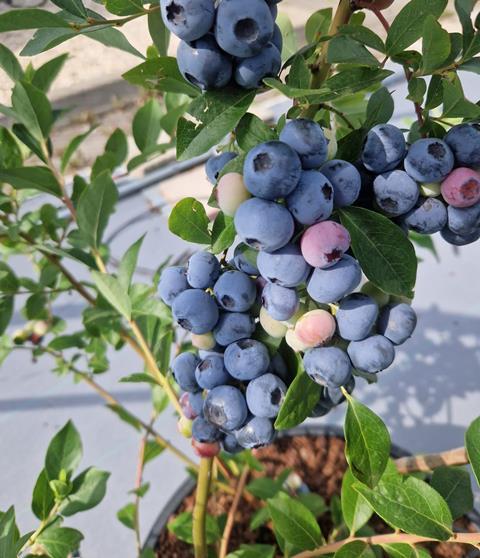The breakthrough cultivar, which combines high yields, excellent fruit size and outstanding flavour, could help reduce the UK’s heavy reliance on imported blueberries and capitalise on Scotland’s ideal growing conditions

Commercially grown, Scottish blueberries could soon be a reality after one of the world’s leading horticultural breeding centres announced it had successfully developed Highland Charm, the country’s first-ever UK-bred variety.
The breakthrough is the result of ten years’ research at the James Hutton Institute’s facility in Invergowrie. During that time, more than 300 unique blueberry crosses from native North American species were evaluated to see if they could flourish in Scotland’s climate.
“This cultivar is a real standout,” commented blueberry breeder Dr Susan McCallum. “It combines high yields, excellent fruit size, outstanding flavour, with a balanced sugar-acid profile and a satisfying bite, and an impressive shelf-life.”
She added: “It is reliable and has performed well in our trials year after year, with consistent yield, size and taste. Growers are really excited about it.”
The new berry has already been successfully trialled in the UK and the EU, and reportedly performed consistently well across multiple seasons and diverse conditions.
UK consumers currently buy around 60,000 tonnes of blueberries a year, but 90 per cent of them are imported from overseas, with only a small pocket of domestic production in the south of England.
More local supply
Researchers at the institute believe blueberries have tremendous potential for expansion and that Highland Charm will meet industry demand for more climate-resilient, home-grown fruit.
They are now exploring how the cultivar fares under different growing conditions and with reduced input systems, a move designed to help the industry achieve greater sustainability and efficiency.
Scotland’s fertile soils, abundant clean water, and milder summer temperatures are said to offer ideal conditions for producing high-quality berries.
Cooler summers extend the ripening period of soft fruit, allowing for greater accumulation of sugars and acids, which results in a more intense, well-balanced flavour compared to berries that ripen rapidly in hotter climates.
Dr McCallum hopes the new berry will encourage consumers to buy in-season, local fruit. “They are fresher with higher health benefits than imported berries that take six weeks to get from the field to the shelves,” she said.
“The imported fruit is often picked slightly too early and while its colour continues to develop, its flavour does not. I guarantee people will taste the difference with in–season, local fruit and will want to go back for more.”
Highland Charm, which will now go through a licensing process to declare it as a “novel and unique” blueberry, is expected to be on supermarket shelves in around two or three years time.
A second related variety is also under development is expected to enter the licensing process next year.








